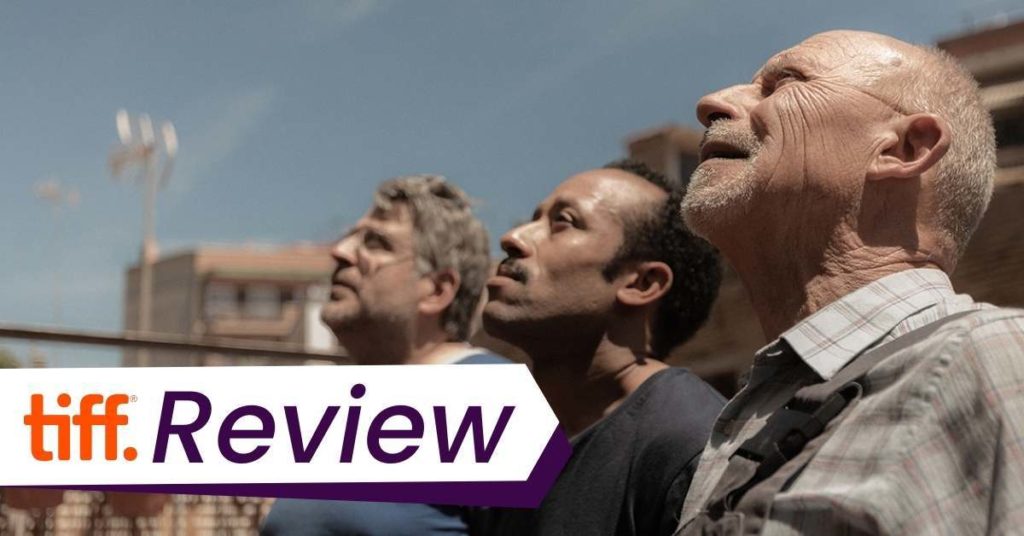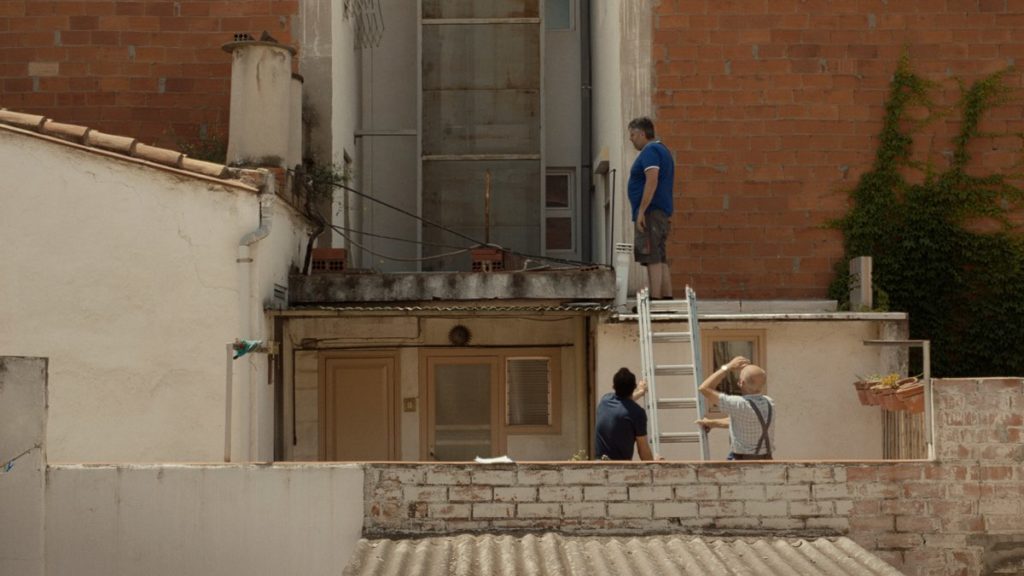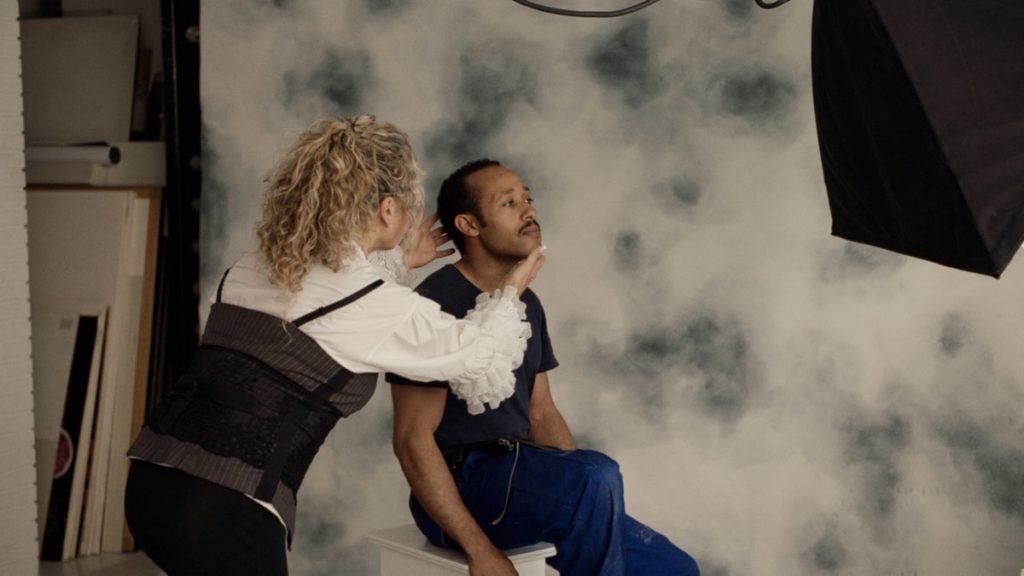Neus Ballús’s film The Odd-Job Men is a quiet, lovely little film that charts a week in the life of three “odd-job men” on the outskirts of Barcelona.
Read all of our TIFF21 coverage here.

We’re running a daily TIFF 2021 newsletter to give you all our reactions to the best new films as they premiere. Click here to sign up for free.
Neus Ballús’s The Odd-Job Men is a quiet, lovely little film that charts a week in the life of three “odd-job men” — plumbers and electricians — on the outskirts of Barcelona. Moha (Mohamed Mellali) is a Moroccan immigrant who takes a job working for the Instalaciones Losilla, a small plumbing company where the eldest member of the team, Pep (Pep Sarrà), is about to retire. The head of the plumbing team, Valero (Valero Escolar), takes an immediate dislike to Moha, for entirely xenophobic reasons, but is overruled by his wife, the boss, who hires Moha regardless. The film follows them during Moha’s one-week trial period (and Pep’s last week on the job) as they venture into people’s homes and lives to attend odd jobs.
Through voiceover, we learn that Moha is a keen observer of human nature, who became an electrician in part so that he’d have an excuse to meet people where they live. Director Ballús’s direction and screenplay mirror Moha’s keen eye for human behaviour, as each job reveals a cast of characters within the city and shows the developing relationship between Moha and Valero.

When the characters are on the job, Ballús tends to favour wide shots, allowing us to observe them at work. When Moha and Valero both appear in the frame but separate in the space — for example, Moha holding a ladder while Valero stands on the roof — we can literally see how they are not really working together. Though sometimes handheld, the camera tends to be rather still, letting the action play out in front of it rather than following each of the characters, which helps us to forget that what we’re watching is at all staged.
From the outset, Valero insists that their customers don’t like foreigners so Moha won’t belong. But all of their clients take an immediate interest in Moha, often recruiting him into their hobbies rather than letting him do his job. In an early scene, a one-hundred-year-old man insists on teaching Moha his daily health regime; when Moha maintains that he needs to fix the man’s tap, the man tells him someone else can do that. A pair of twins and later a photographer also take a keen interest in Moha, leading to some of the film’s best laugh-out-loud moments: too good to reveal here.
Of course, the more their clients take a liking to Moha, the more Valero feels left out, the more he’s forced to work on his own, and the more he resents Moha. Moha represents all the things Valero isn’t: young, handsome, muscular, gregarious, and eager to make his way in the world. Valero resents Moha for these attributes and takes it out on him with verbal abuse, passive aggressive behaviour, and just general unfriendliness. He’s trying to stave off any kind of change, including his own aging, but the only thing he can control is his behaviour toward Moha.

At home, for both Moha and Valero, there is a mix of warmth and tension. Moha is studying Catalan in night school, and his roommates are actively combative, refusing to be quiet or leave him be for his studies; like Valero, they envy Moha’s ambitious spirit, and end up trying to beat him down in the same ways they have been by the xenophobia they faced. After putting in long days at work with Valero, Moha dutifully attends classes and studies, preparing for his exam, looking for a better future. Meanwhile, Valero shares warm exchanges with his daughter and casual intimacy with his wife, but there’s a melancholy to him that comes out more strongly at home. He’s on a diet, trying to fit into a suit for a wedding, and feeling the changes to his body that make him hate himself. His sadness is also visible in quiet moments when we observe him at work.
Ballús describes The Odd-Job Men as a ‘hybrid documentary’, in which she sent her characters into unexpected situations and captured their reactions. Real life plumbers Mellali, Escolar, and Sarrà play versions of themselves in the film, after spending three years training with Ballús to develop improvisational skills. The encounters in the film do have the feeling of authenticity: nothing much happens, but lots of human nature is revealed. Ballús couples these scenes with wide shots of the neighbourhoods where the team works, showing slices of life on the balconies that create a community. With Valero and Moha as our guides, Ballús grants us access to a whole world within Barcelona, its cultural and language tensions, and the growing relationship between two men forced to work together.
The Odd-Job Men screens digitally across Canada on Monday, Sept 13 at 3 pm and Thursday, September 16 at 9 pm. The film is available for a 4-hour window.
Stay in the know about TIFF 2021.
Subscribe to Seventh Row’s TIFF newsletter.
We’re running a daily newsletter during the festival: every morning, we’ll send subscribers a dispatch about all the new films we’re watching, good and bad, to let you know what’s worth keeping an eye on.
Click here to subscribe to the TIFF 2021 newsletter.
Explore the spectrum between fiction and nonfiction
Subjective realities: The art of creative nonfiction is a tour through contemporary creative nonfiction, aka hybrid or experimental documentaries. Discover films that push the boundaries of the documentary form.


